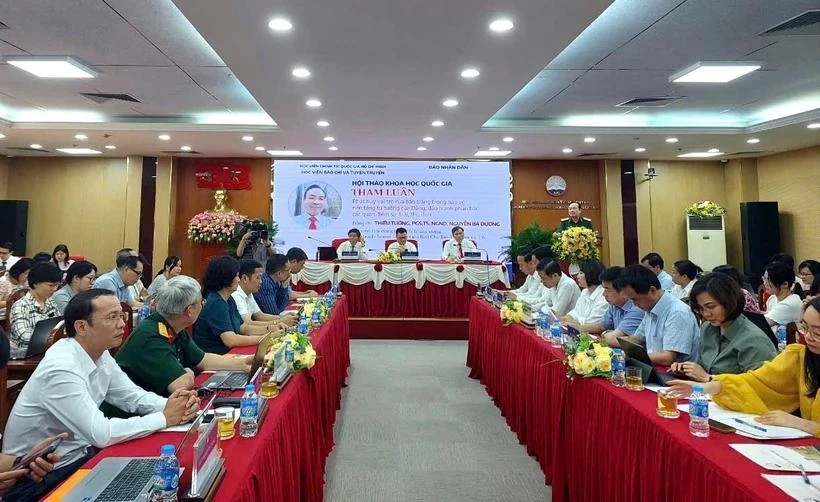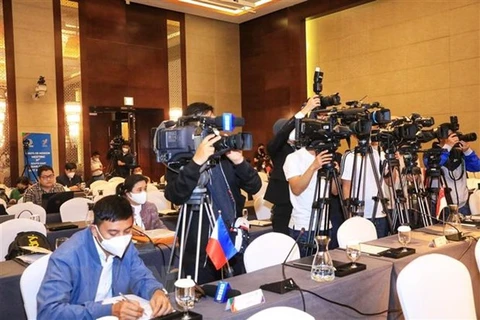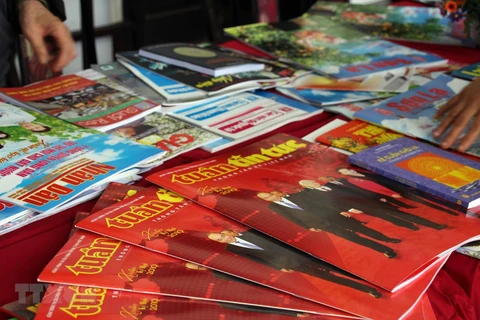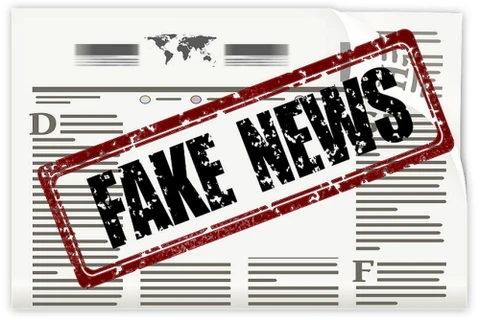
Hanoi (VNA) - Journalism plays a crucial role in guiding public opinion, spreading positive information amidst the daily news flow. It promptly reflects the thoughts, aspirations, and legitimate requests of the people, contributing to strengthening the close bond between the Party and the people as well as fostering the national unity, a senior official has remarked.
The statement was made by Le Quoc Minh, member of the Party Central Committee and Vice Chairman of its Commission for Information and Education, at a national scientific seminar on the role of the Party's press system in protecting its ideological foundation and countering misleading and hostile views. The event was co-organised by the Academy of Journalism and Communication and Nhan Dan (People) Newspaper in Hanoi on September 16.
Challenges and responsibilities
According to Minh, who is also Editor-in-Chief of the newspaper and President of the Vietnam Journalists Association, since the 12th Politburo’s issuance of Resolution No. 35-NQ/TW on strengthening the protection of the Party's ideological foundation and countering misleading and hostile views in the new situation, the press agencies within the Party's system have effectively joined the effort using diverse and creative approaches.
However, the official said there are significant challenges for Party-affiliated news agencies in fulfilling their responsibilities to protect the ideological foundation and counter incorrect and hostile narratives. This is particularly true as Vietnam is integrating more deeply into the global arena, with the explosion of information on the Internet and social media offering a breeding ground for hostile forces to exploit and undermine the Party's ideological foundation.
Echoing this view, Professor and Doctor Le Van Loi, Deputy Director of the Ho Chi Minh National Academy of Politics (HCMA), underscored the necessity of continuing to improve the quality and effectiveness of the Party's press system in safeguarding the ideological foundation and combating misleading and hostile perspectives.
Ongoing efforts and future directions
At the seminar, Vu Thi Huong Thuy, a member of the executive board of the Vietnam News Agency (VNA)’s Party Organisation and head of the VNA Party Committee Office, shared insights about the agency's related efforts.

According to Thuy, in the first six months of this year alone, the VNA addressed 115 internal reports on sensitive issues related to security, defence, diplomacy, and economy in the country and abroad, to serve the leadership of the Party and State. The agency also reported and synthesised external opinions about the country’s situation. It covered meetings of the Party Central Committee, the National Assembly (NA)’s Standing Committee, as well as assessments of impacts from Party personnel changes on Vietnam's foreign policy, business climate, and corruption fight.
Additionally, numerous articles from the VNA have brought together reputable scholars and others to participate in discussions, seminars, and to write rebuttals against false and hostile views.
Thuy went on outlining five major missions for journalism in the future, which include enhancing ideological guidance work, accompanying the country in the realisation of its goals and serving the country’s and people’s interests, and effectively executing the function of social criticism.
It is also necessary to actively spread positive messages and minimise negative and harmful narratives, as well as to take a leading role in disseminating the country's foreign policy perspectives, she affirmed.
Thuy concluded that achieving these missions will ensure journalistic works truly represent the voice of the Party, the State, and socio-political organisations, serving as a trustworthy forum for the people./.






















